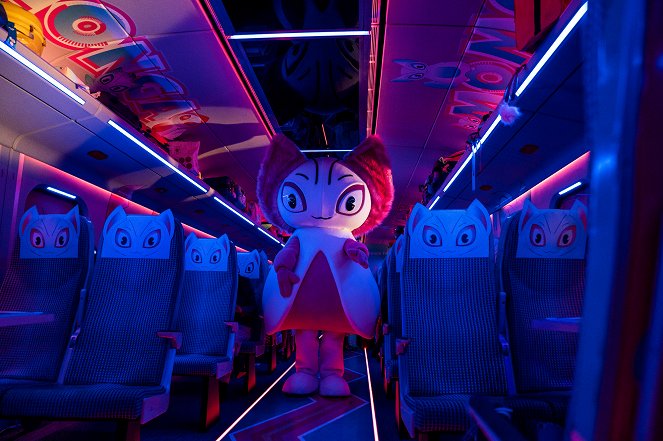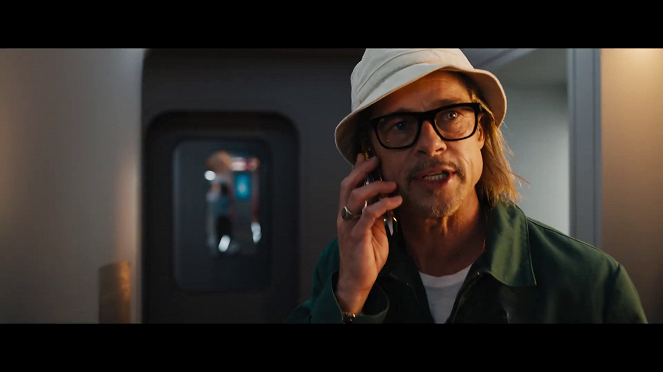Directed by:
David LeitchScreenplay:
Zak OlkewiczCinematography:
Jonathan SelaComposer:
Dominic LewisCast:
Brad Pitt, Joey King, Aaron Taylor-Johnson, Brian Tyree Henry, Andrew Koji, Hiroyuki Sanada, Michael Shannon, Bad Bunny, Sandra Bullock, Zazie Beetz (more)VOD (5)
Plots(1)
Unlucky assassin Ladybug (Brad Pitt) wants to do things peacefully after a run of bad luck and takes a job retrieving a briefcase on a bullet train in Japan. After snatching the briefcase, he discovers that there are multiple other assassins on board the train, all with connected but conflicting missions. (Sony Pictures Home Entertainment)
Videos (4)
Reviews (16)
This will be an evergreen. This loud-mouthed and extremely entertaining Guy Ritchie-style gangster comedy combines with inventive Wick-style action with OTT humor. This time Leitch shows his best, not just as a great action director, but also as a good storyteller who doesn’t forget the point and somebody capable of alternating genres very naturally. The cast is wonderful. Pitt is clearly enjoying himself immensely as Ladybug, but Aaron Taylor-Johnson’s Tangerine does his best at hogging the spotlight. Bullet Train is a potential cult movie which has come under greater scrutiny and been played at movie theaters only thanks to Brad Pitt’s aura. Thanks for that, Brad!
()
Ladybug is an assassin in need of an easy job, so she boards a Japanese express train to find and steal a seemingly ordinary suitcase. Little does she know she's walking into a trap. There are more killers on the train, and soon blood is flowing. David Leitch delivers a very wild action comedy which, apart from the great action, offers an interesting and above all very attractively told story that alternates humour with drama and lots of crazy twists. Bullet Train is reminiscent of Guy Ritchie's gangster movies peppered with lots of shootings and fights. And although it loses a bit of pace towards the end, it's definitely worth getting on this train.
()
Overly verbose, long and overly complicated mess... Unbelievable even in the context of wacky comedies. It's nothing like a Guy Ritchie movie, though it wants to be, and it's a shame, mostly because of the impeccable cast, the good directorial ideas, and some really unexpected and funny moments that didn't go to waste or get lost in all that mess.
()
Overblown, epileptic postmodernism, or when the director of the most imaginative American action films of the last decade takes on a script that he wants to make into something more than action. The mix of Ritchie, Tarantino and Japanese culture can be seen at every turn, but it works at about half speed.
()
Bullet Train can be criticised for a lot of things, but it can also be enjoyed for the same reasons. Here we have Japan literally on a high-speed train together with a furious pace and non-linear narrative that rather serves to divert the viewer’s attention and mask the screenplay’s shortcomings, as well as the simulation of depth and reach typical of the source material’s author, Kōtarō Isaka. Unlike Japanese adaptations of Isaka’s novels, here the motifs of interconnectedness, luck and fate do not evoke wonder and pathos, but are ground down into superficially entertaining attractions. Bullet Train also works with Tarantino-esque characters, i.e. absolutely unrealistic genre characters that stand out due to their exaggeration, stylishness and grounding in pop culture. Based on the described principle, Tarantino and some of his disciples create sophisticated, powerful and seemingly well-thought-out gangsters and killers that, in the best case, transcend the level of the wet dream of fictional perfection and become semi-divine ideals that viewers admire. In Bullet Train, however, they just remain unrealistic, amusing puppets with one cartoonishly exaggerated and endlessly repeated attribute. Then we have the action scenes, or rather their choreography, which was at the forefront in previous 87North (or 87Eleven) productions, drawing attention to itself through spectacular physicality, difficulty of execution and revolutionary ingenuity. This time, the action is rather in the background, always primarily in the form of slapstick gags connecting the individual plot sequences. Whatever overarching term we use for the film’s described tendencies – bastardisation, anti-sophistication, dumbing-down, assimilation or Hollywoodisation – this is what gives Bullet Train its charm and effectiveness. The film absorbed into itself every possible trend of previous years and even decades that had been valued by overly clever fans, cinephiles and devotees of alternative niches, and strained them through the mainstream filter to create a universally accessible form. It will inevitably be derided by the elites because it is not like the perfect forms that they appreciate, but it will make Bullet Train a popular box-office hit. After Fast & Furious Presents: Hobbs & Shaw, Leitch’s subsequent project evokes the middle-of-the-road works of Hong Kong cinema’s golden era, which comprised chaotically disparate variety shows blending together a multitude of emotions and genre positions, and where the audience’s attention was constantly drawn to various attractions, including action escapades and cameo appearances by popular stars. If we recall that David Leitch and his contemporaries are great admirers of Hong Kong movies, it’s possible to see this not as a coincidence, but as a concept.
()
Gallery (56)



Ads